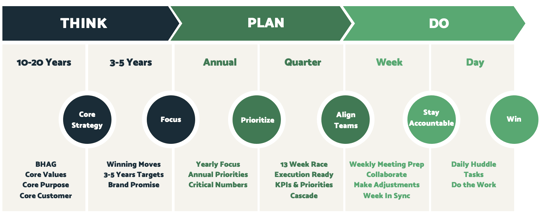I have been helping companies develop their strategies for growth and profitability for over twenty years. As with many consultants, I started helping companies plan in a very traditional manner by developing 3-inch thick plans that would make any coffee table or bookshelf proud.
I am being a bit sarcastic, and I know sarcasm is not a true form of humor, but bear with me for a moment as I make my case. It is not that the work we did together did not produce valuable plans with real substance. Actually, part of the problem was that there was too much substance in most cases, so the plans became overwhelming and extremely difficult to execute. I would come back quarterly, or in some cases annually, and as we began to the review the plans, I would hear comments like, “Oh yes, now I remember talking about that in planning.” Laughs would emerge around the room, but the truth of it is that it was not really that funny, considering the lost opportunity and lack of results.
This is why you need an execution system to drive results you can count on. What is an execution system? There are different answers to this question, but from my standpoint it looks like this:
1. You need a methodology that will guide you. We use Think – Plan – Do, which takes a very complete approach to developing your core ideology, long term strategies for growth and profitability and a meeting cadence that drives planning and execution. Here is a model of what that looks like:

2. You need a cloud-based software tool like Rhythm to drive your execution and keep your plans in front of you, quarter after quarter, week after week, and every single day. This tool should tie into your Annual Priorities and long-term goals. It also allows you to plan not only at the executive level but with each functional level below. Having these plans connected and integrated is very powerful and a game changer to get everyone in your company aligned and focused to work on the Priorities and projects that provide the most value for your stakeholders and customers. It also gives you visibility when things are off track so that you can make adjustments on a daily or weekly basis. This is a minor-major that drives strong execution. Rather than your plans sitting on a bookshelf, you are looking at them daily, finding solutions, and making adjustments that will make your teams successful.
Based on the last research I did, only about 30% of companies today have digitized their plans. I tell clients that doing so gives you a competitive advantage and greatly improves your ability to execute successfully.
3. You need a consultant that can help you and your teams develop execution-ready plans that drive predictable results. Having an expert provide facilitation, share best practices, and help identify patterns for success can take your planning to the next level while giving everyone on the team the opportunity to participate and focus. In addition, your consultant can help with strategy development and coach the team for accountability. It is very helpful to have an outside, unbiased resource who’s only desire is to see you and your company accomplish your goals and hit your targets.
In order to get predictable results, I encourage you to invest in a system that consists of a methodology, a cloud-based software system to drive your execution, and an external expert to help you plan effectively and coach you and your teams for accountability.
As always, please let me know your thoughts and execute well. —Alan
Watch this short video about Rhythm's execution system:
Here are additional resources to read:
Departmental Silos: The Silent Killer
How CEOs Succeed—Achieve A Top Valuation Through Strategy Execution Software
How to Fix Your Weekly Team Meetings
Using Systems to Grow as Your Company Scales
What Are The Top 8 Challenges for Mid-Market Companies? Survey Says...
Company Alignment: The CEO's Roadmap to Organizational Alignment
Don't Confuse Strategic Thinking and Execution Planning
Photo Credit: iStock Photos


